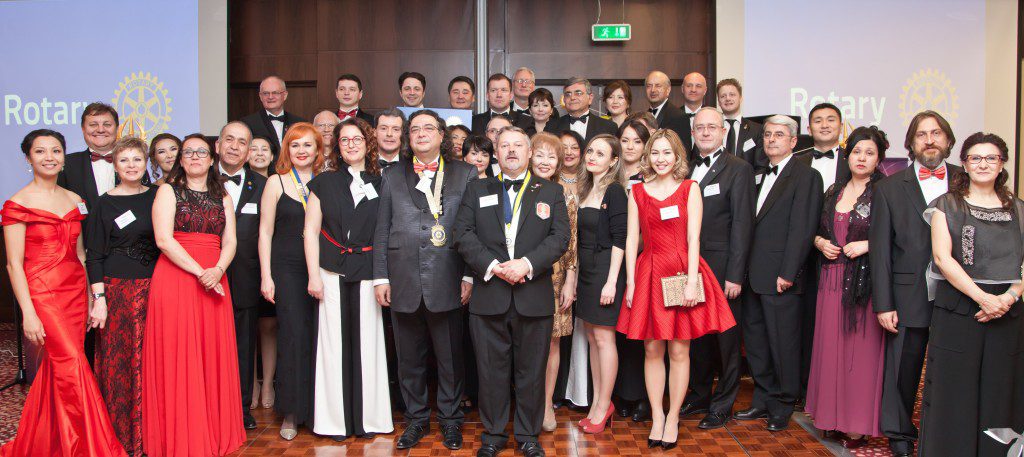Astana’s Rotary Club Launches
ASTANA – Astana’s Rotary Club has now become operational, marking their launch with an opening ceremony in the capital’s Hilton Garden Inn on April 16. The humanitarian club has launched with around 30 members, but will be hoping to attract more, Chairman of the Membership Committee Taylan Karamanli confirmed in an interview on April 17.

Governor of Rotary International District 2430 Korhan Atilla and President of the Astana Rotary Club Gareth Stamp with attendees at Astana club’s official launch.
“There is a need in all countries, developed or developing, for charitable humanitarian organisations,” Gareth Stamp, first president of the Astana Rotary Club, said in a statement on the launch. “Government cannot be expected to do everything and deep down people care and want to help others. During my time in Kazakhstan I have been privileged to meet amazing people who do amazing things for others. Kazakhs have shown me amazing hospitality, generosity and friendship and I want to do my bit in return.”
The invitation-only clubs, which are found in nearly every country in the world, gather prominent members of their local communities to coordinate charitable and humanitarian projects. The nearly 100 year old organisation is currently working on the End Polio Now project, an ongoing, 10-year collaboration with the United Nations Children’s Fund (UNICEF), the World Health Organisation (WHO), the Bill and Melinda Gates Foundation that has seen the gradual disappearance of the disease in all but a handful of countries.
Now that the Astana chapter has launched, it will also be focusing on local issues, and they plan to tackle even difficult topics like health education and sexual health, Stamp reported. “The new Rotary Club of Astana will be the second in Kazakhstan but is already the biggest with nearly thirty members, who are all committed to doing good for others. … Over the coming months we will be investigating areas where we can best target our resources to make long lasting and sustainable projects. We will be concentrating on projects that change lives – whether they are in education or vocational training, health – particularly women’s and children’s health – providing clean drinking water or developing people’s entrepreneurial spirit. All of our members have skills and expertise that will be shared to help develop future generations,” he said.
The group’s first activities will probably be related to raising awareness of the group and fundraising. These may include a bike tour around Astana sometime next month, Karamanli said, and a car journey from Astana to the U.K., with stops at other Rotary clubs along the way, Stamp suggested.
Projects will be decided upon by members as the group evolves. Rotary membership rules stipulate that clubs should strive for broad representation among a variety of professions, and Stamp says the Astana club will first be looking in particular to attract legal professionals and international members, as well as any former members of other Rotary clubs (Karamanli, for example, was a member of a Rotary club in New Jersey before moving to Kazakhstan).
“It’ll be good for the city,” Karamanli, managing director of the alternative energy company KB Enterprises in Astana, said. “It’s important for Astana. Astana is a good city, a big city, but still, the image is not there yet,” he said. Having a Rotary Club will add to Astana’s prestige, he suggested, and because of attendance requirements for Rotary meetings and events, having a club in Astana means travelling Rotarians – who will be prominent members of their home communities – will have an opportunity to attend meetings in Astana, increasing connections between Astana and the international community.
Astana’s Rotary Club is the second in Kazakhstan, though it is already the largest; Almaty’s Rotary Club launched in 1995.
